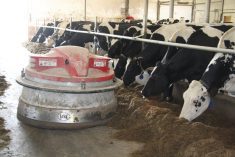WILLIAMS LAKE, B.C. – Traceability should improve animal health and food safety but it also must provide value to producers. “We all know the primary producer bears the costs at the end of the day,” said Erik Butters, an Alberta director with the Canadian Cattlemen’s Association.Producers must buy and insert the radio frequency tags and submit the information to the Canadian Cattle Identification Agency, but many complain that little benefit is returned to them. “CCA supports movement toward a better traceability system but our fear of government is that if we don’t get ahead of this thing and set some parameters of what we are willing to live with and give the government some guidance, they are going to come down and say this is what you have to do,” Butters said at the British Columbia Cattlemen’s Association convention in Williams Lake, B.C., May 28-29.He said producer groups want practicality in reporting animal movement that includes a tagging system that works properly.”We are not prepared to get ahead of technology. Technology is going to have to be developed first and traceability will follow,” he said.One change includes the switch to electronic button tags from plastic bar code tags. As of July 1, all cattle must be tagged with an approved radio frequency identification tag when they leave their farm of origin.Producers are being told to leave the plastic tag in the animal’s ear and add the electronic tag, then cross reference the numbers with the Canadian Cattle Identification Agency so information on individuals is re-tained for traceability.The provincial and federal governments want full traceability by 2011 but groups have found some requirements impractical. They include recording all movement of animals even if the owner is transferring animals between pastures.Butters outlined a five point statement on what the industry wants from traceability. Written by the CCA, it includes signatures from the Alberta Beef Producers, CCIA and other beef groups:* Traceability will support industry standards for commerce. The highest volume of cattle is sold in the fall each year through auction markets. Movement should be recorded at points of handling or points of sale but not when animals are moved from one pasture to another unless ownership changes. * Traceability should enhance the competitive position of the industry.* Traceability will not get ahead of the technology. Tags and readers need to be capable of reading large numbers of animals at the normal speed of commerce rather than trying to scan animals individually.* Tag readability and retention of tags should be re-examined. It is not practical to expect 100 percent retention of tags or 100 percent readability.* All producer information must remain confidential. Producers at the meeting were concerned about privacy and defeated a motion that asked to release information on stray or lost animals to brand inspectors, police or other officials trying to match the livestock with the owners.”There is legal identification of branding and there are other things you could do to identify those cattle. Those tags should not be used for identification like that,” said Ernie Willis, a rancher at Princeton, B.C.
Read Also

Manitoba extends Crown land rent freeze
Manitoba government links the continued rental rate freeze on grazing and forage leases to economic and environmental challenges facing the industry















